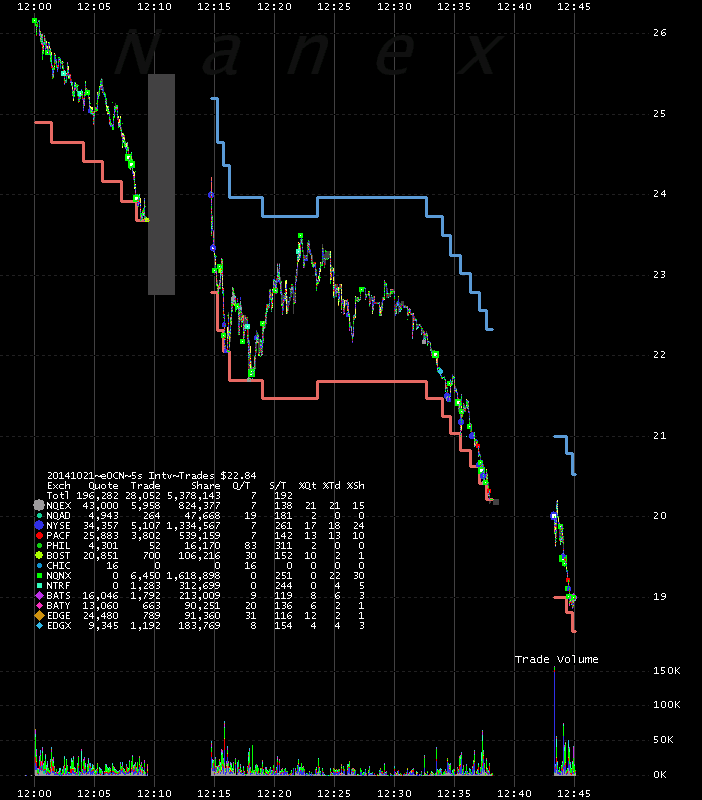Domingo Halliburton
Handmade in USA
Q3 sector earnings scorecard:



Fed official wants to keep up QE as inflation expectations slip

2 hours ago
- By Jonathan Spicer and Michael Flaherty
(Reuters) - The Federal Reserve should keep buying bonds for longer than planned in the face of volatile markets and falling inflation expectations, a top U.S. central banker said on Thursday, even as another Fed policymaker warned against an over-reaction.
James Bullard, president of the St. Louis Fed, is the only official at the central bank to publicly suggest putting on hold the Fed's widely telegraphed plan to halt its asset-purchase program later this month. Yields on U.S. bonds, which have plunged the last few days, rebounded after his comments.
"We can go on pause on the taper at this juncture and wait until we see how the data shakes out into December," Bullard said on Bloomberg Television. "Inflation expectations are dropping in the U.S. and that is something that a central bank cannot abide."
"A reasonable response by the Fed in this situation would be to invoke the clause ... that says the taper was data dependent," he added.
Encouraged by strengthening U.S. growth and falling unemployment, the Fed has incrementally tapered its bond buying program from $85 billion originally to $15 billion this month. It was set to shutter the program at a policy meeting Oct. 28-29, a plan that Fed Chair Janet Yellen may well stand by.
But stock market values and bond yields have dropped sharply in recent weeks as investors fretted over the health of the world economy, with fears growing that Europe could tip into recession, damaging the U.S. economy. The dollar has continued its climb, causing measures of medium-term inflation expectations to ease.
Bullard, who has long focused on inflation to inform his policy beliefs, had until Thursday been seen as a hawkish policymaker intent on closing the book on accommodation and raising interest rates starting early next year.
He said he was sticking with his forecast for a rate hike in the first quarter of next year for now, but wanted to see how the market turbulence played out.
While Bullard, who does not have a vote on policy this year or next, wants to keep buying $15-billion in bonds for another couple of months, Philadelphia Fed President Charles Plosser said the selloff was not yet significant enough to hurt the U.S. economy or to garner a response from the central bank.
The Fed should not overreact when the domestic economy looks stable, Plosser told reporters in Allentown, Pennsylvania.
"I don't think anything I've heard has suggested to me it's of a significance ... to throw the U.S. economy off the tracks," said Plosser, who has a vote on Fed policy. "It could, but at this point the numbers just aren't big enough to really get too excited."
Plosser acknowledged that a big selloff could harm U.S. consumer demand, but added the strong job market would offset that. The Fed "would address it (depending on) how we thought it would affect inflation and employment," he said.
On Wall Street, the price of the 30-year U.S. bond dropped more than 1 point and stocks rebounded after Bullard's comments.
Bets on the timing of a Fed interest rate rise have fallen back to October or December of 2015, from mid-2015 a few weeks ago, based on futures markets. Fed Vice Chair Stanley Fischer and New York Fed President William Dudley, among other core Fed decision-makers, have in recent days suggested mid-2015 was still reasonable timing for a tightening.
Speaking in Billings, Montana on Thursday, Minneapolis Fed President Narayana Kocherlakota repeated his view that a rate hike in 2015 would be inappropriate.
(Reporting by Jonathan Spicer and Michael Flaherty; Additional reporting by Ann Saphir and Krista Hughes; Editing by Chizu Nomiyama and Andrea Ricci)



I'm prayingLooking like crude might have found a bottom brehs? Some good (I guess) data from China is going to make it a nice day.
